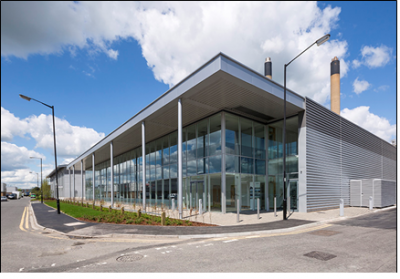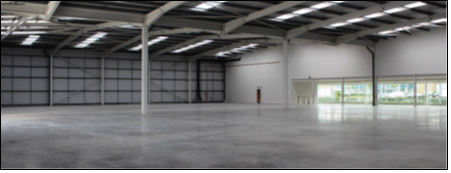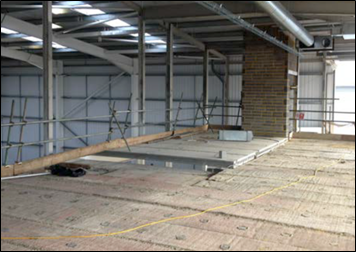Difference between revisions of "9 Cambridge Avenue"
| (11 intermediate revisions by 2 users not shown) | |||
| Line 1: | Line 1: | ||
{{#image_template:image=File:CE_32.png|caption=9 Cambridge Avenue, Slough|align=right|wrap=true|width=400}} | {{#image_template:image=File:CE_32.png|caption=9 Cambridge Avenue, Slough|align=right|wrap=true|width=400}} | ||
| − | In 2015, as part of SEGRO’s master-planning of their Slough business park, the building at 9 Cambridge Avenue, was relocated to a new plot 1 mile away. | + | In 2015, as part of SEGRO’s master-planning of their Slough business park, the building at 9 Cambridge Avenue, was relocated to a new plot 1 mile away. This is a good illustration of steel's contribution to [[Steel_and_the_circular_economy|the circular economy]]. |
| − | The warehouse building with offices to the front elevation, was built in 2000. The floor area is 3, | + | The warehouse building with offices to the front elevation, was built in 2000. The floor area is 3,320m<sup>2</sup>. The original building was brick-clad on three sides with full height [[Facades_and_interfaces#Curtain walling|curtain walling]] to the front. |
| − | The brief [http://www.segro.com/ SEGRO] gave to the main contractor, [ | + | The brief [http://www.segro.com/ SEGRO] gave to the main contractor, [https://www.francisconstruction.co.uk/ Francis Construction], was to [[Recycling_and_reuse#Reuse|reuse]] as much as possible of the original building and the project must cost less than an equivalent new build. The relocation was complicated by the fact that the building required to be ‘flipped’ from its original layout to suit new access requirements at the new location. |
{{#image_template:image=File:CE_33.png|caption=Internal view of the warehouse|align=left|wrap=true|width=500}} | {{#image_template:image=File:CE_33.png|caption=Internal view of the warehouse|align=left|wrap=true|width=500}} | ||
| − | The re-erected steel frame was clad in a new, composite steel cladding system. A new roof was installed on the relocated building because of the risks associated with reusing the old roof, particularly the roof lights. | + | The re-erected steel frame was clad in a new, [[Building_envelopes#Insulated_.28composite_or_sandwich.29_panels|composite steel cladding system]]. A new roof was installed on the relocated building because of the risks associated with reusing the old roof, particularly the roof lights. |
In addition to the steel structure, the glazing, staircases, loading doors, the precast beams and planks, the curtain walling, fencing, lift and balustrading were all reused in the new, relocated building. | In addition to the steel structure, the glazing, staircases, loading doors, the precast beams and planks, the curtain walling, fencing, lift and balustrading were all reused in the new, relocated building. | ||
| Line 12: | Line 12: | ||
The project was completed in 56 weeks. | The project was completed in 56 weeks. | ||
<br clear=all> | <br clear=all> | ||
| − | The carbon saving associated with this project was quantified by | + | The carbon saving associated with this project was quantified by Sturgis Carbon Profiling (SCP) who concluded that the relocated building represented: |
| − | *56% less embodied carbon at practical completion compared to a comparative New Build. | + | *56% less [[Life_cycle_assessment_and_embodied_carbon#What_is_embodied_carbon.3F|embodied carbon]] at practical completion compared to a comparative New Build. |
*25% saving in costs compared to an equivalent New Build. | *25% saving in costs compared to an equivalent New Build. | ||
| − | {{#image_template:image=File:CE_34.png|caption=Reinstalling the precast units|align=left|wrap=true|width=400}} | + | {{#image_template:image=File:CE_34.png|caption=Reinstalling the precast concrete units|align=left|wrap=true|width=400}} |
| − | The project was Highly Commended in the Constructing Excellence 2015 awards. | + | <br clear=all> |
| + | The project was Highly Commended in the [https://constructingexcellence.org.uk/ Constructing Excellence] 2015 awards. | ||
| + | |||
| + | [[Category:Case studies - Recycling and reuse]] | ||
Latest revision as of 08:32, 16 May 2023
In 2015, as part of SEGRO’s master-planning of their Slough business park, the building at 9 Cambridge Avenue, was relocated to a new plot 1 mile away. This is a good illustration of steel's contribution to the circular economy.
The warehouse building with offices to the front elevation, was built in 2000. The floor area is 3,320m2. The original building was brick-clad on three sides with full height curtain walling to the front.
The brief SEGRO gave to the main contractor, Francis Construction, was to reuse as much as possible of the original building and the project must cost less than an equivalent new build. The relocation was complicated by the fact that the building required to be ‘flipped’ from its original layout to suit new access requirements at the new location.
The re-erected steel frame was clad in a new, composite steel cladding system. A new roof was installed on the relocated building because of the risks associated with reusing the old roof, particularly the roof lights.
In addition to the steel structure, the glazing, staircases, loading doors, the precast beams and planks, the curtain walling, fencing, lift and balustrading were all reused in the new, relocated building.
The project was completed in 56 weeks.
The carbon saving associated with this project was quantified by Sturgis Carbon Profiling (SCP) who concluded that the relocated building represented:
- 56% less embodied carbon at practical completion compared to a comparative New Build.
- 25% saving in costs compared to an equivalent New Build.
The project was Highly Commended in the Constructing Excellence 2015 awards.






